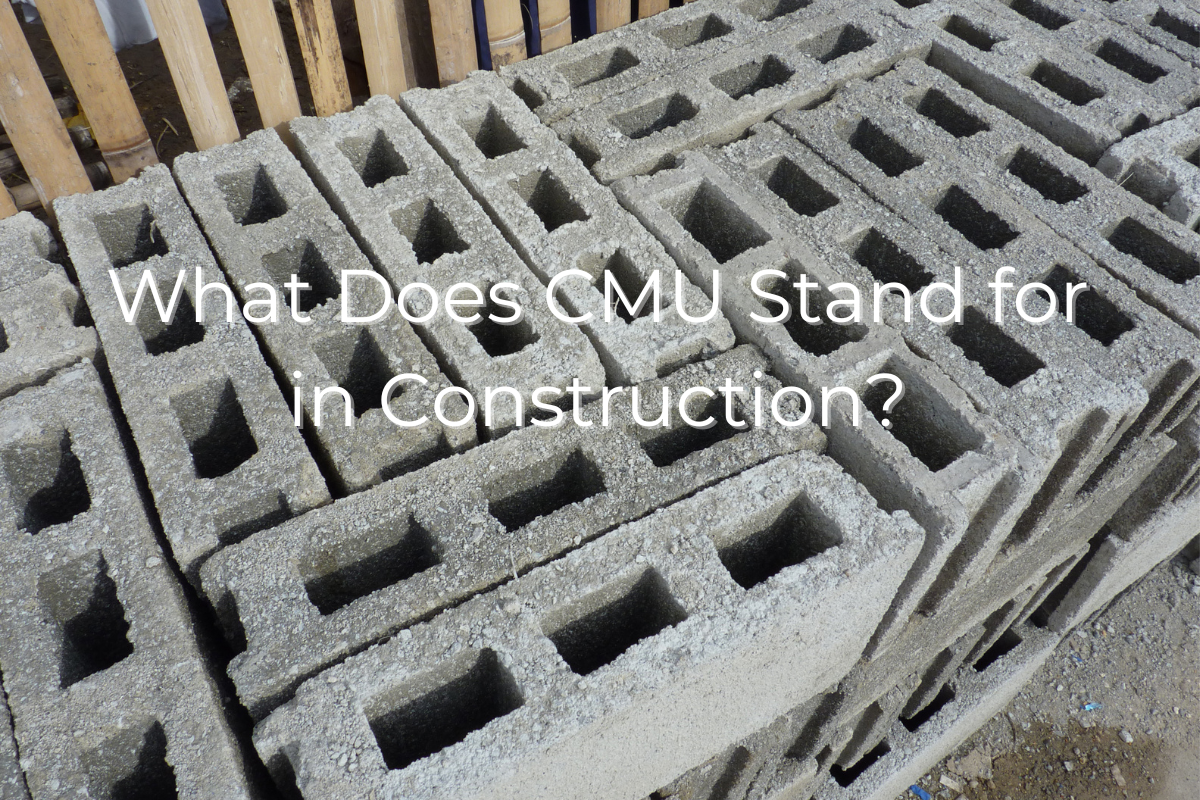
What Does CMU Stand for in Construction?
When you walk into a newly constructed building or observe a masonry wall being built on a construction site, you might notice a specific type of block being used—often a rectangular concrete unit. This block is commonly referred to as CMU, which stands for Concrete Masonry Unit. Concrete masonry Units are a cornerstone of construction, particularly in the realm of commercial, industrial, and residential buildings, providing both structural integrity and aesthetic value.
In this blog, we will explore what does CMU stand for in construction, how it is made, its various types, and why it is an essential component in many construction projects.
What does CMU (Concrete Masonry Unit) Stand for?
At its core, a CMU is a rectangular block made from a mixture of cement, water, and aggregate (like sand, gravel, or crushed stone). The blocks are typically formed and cured under controlled conditions, and they are designed to be durable and strong enough to withstand the pressures and stresses encountered in construction. Concrete Masonry Units (cmus) come in a variety of sizes, but the standard size is often 16 inches long by 8 inches high by 8 inches deep.
These units are primarily used for constructing walls, whether for foundation walls, exterior facades, or interior partition walls. Their design allows them to be easily stacked, aligned, and mortared together to form solid, stable structures, especially in outdoor projects.
The Composition and Manufacturing Process of CMUs
CMUs are produced by mixing cement with aggregates and water, then pouring the mixture into molds to form the blocks. After being molded, the blocks are cured, typically in a high-temperature environment to ensure the mixture reaches its intended strength.
The composition of the materials used for CMUs can vary depending on the intended use of the block. For example, some CMUs are made with additional additives like lightweight aggregates to reduce their weight, while others may include fire-resistant materials for enhanced fire protection.
Types of CMUs
CMUs are versatile and come in several different types, each suited for specific construction needs. Here are some of the most common types of CMUs used in construction:
-
Standard CMUs: These are the basic concrete blocks commonly seen in construction projects. Standard CMUs are often used for general structural purposes and are typically solid. They provide excellent strength and are cost-effective.
-
Hollow CMUs: These blocks have hollow cores, which help to reduce the weight of the block while maintaining its strength. The hollow cores also allow for insulation material to be placed inside, making hollow CMUs ideal for projects where thermal insulation is a priority.
-
Insulated CMUs: These blocks contain foam insulation, providing a higher R-value (thermal resistance) than traditional CMUs. Insulated CMUs are commonly used in energy-efficient building designs to enhance thermal performance while maintaining structural integrity.
-
Decorative CMUs: Decorative or architectural CMUs come with different textures, colors, and finishes. They are typically used for facades or walls where aesthetics are a priority, such as in public buildings, schools, or churches. These blocks often have a smooth or patterned surface to provide an attractive appearance.
-
Fire-Resistant CMUs: These blocks are designed specifically to provide fire resistance, making them suitable for applications that require high levels of fire safety, such as fire-rated walls in commercial or industrial buildings.
-
Load-Bearing CMUs: Some CMUs are designed to bear loads, making them ideal for load-bearing walls in construction. These blocks have additional strength and are often used in foundation and structural walls.
Advantages of CMUs in Construction
CMUs are a popular choice in construction for a variety of reasons. Let’s take a look at some of the key advantages:
-
Durability and Strength: Concrete is known for its strength and durability, and CMUs are no exception. They are resistant to many of the environmental factors that might affect other materials, such as termites, rot, or fire. When properly installed and maintained, CMUs can last for decades, making them a long-term investment for building projects.
-
Cost-Effectiveness: CMUs are relatively inexpensive compared to other construction materials like steel or precast concrete panels. The manufacturing process is straightforward, and the materials required are generally affordable, making CMUs a cost-effective choice for many types of construction projects.
-
Versatility: Whether you’re building a small residential wall or a large commercial structure, CMUs offer incredible versatility. Their various sizes and types allow them to be used for a wide range of applications, from foundations to facades, partition walls to retaining walls.
-
Fire Resistance: Concrete is inherently fire-resistant, and CMUs are no exception. This property makes them especially useful in fire-rated walls, which are required in buildings to prevent the spread of fire between different areas of the structure.
-
Sound Insulation: The density of CMUs provides excellent sound insulation properties. This makes them ideal for constructing walls between rooms or in buildings where noise reduction is important, such as in apartment complexes, hotels, or office buildings.
-
Energy Efficiency: Hollow CMUs or insulated CMUs can contribute to the overall energy efficiency of a building. By providing an additional layer of insulation, they help to regulate the temperature inside the structure, reducing the need for heating and cooling systems.
Applications of CMUs Outdoor And Indoor
CMUs are used in a wide range of construction applications:
-
Foundations: CMUs are often used for foundation walls in residential, commercial, and industrial buildings. They provide a solid base that can withstand pressure and shifting soil.
-
Retaining Walls: CMUs are commonly used in landscaping and civil engineering projects to construct retaining walls that hold back soil and prevent erosion.
-
Partition Walls: In both commercial and residential settings, CMUs can be used to build interior partition walls, offering durability and fire resistance.
-
Exterior Walls: Many buildings use CMUs for the exterior walls of their structures, as the material is durable, weather-resistant, and low-maintenance.
-
Security Walls: CMUs are also used to construct walls around properties for security purposes, such as around schools, prisons, or industrial facilities.
Conclusion
CMUs, or Concrete Masonry Units, play an essential role in the construction industry as well as home construction projects. Their strength, durability, and versatility make them a go-to material for a variety of building applications, from residential homes to commercial and industrial properties. Understanding the different types of CMUs and their benefits can help construction professionals make informed decisions about the best materials for their projects.
Whether you’re looking to build a foundation, create a soundproof partition, or design an aesthetically pleasing exterior wall, CMUs are a reliable, cost-effective, and durable choice that can meet a wide range of construction needs in any area.
As the industry continues to innovate with more energy-efficient and sustainable building materials, CMUs remain an important part of the construction landscape, providing value, functionality, and long-term performance. Many local contractors can help you in finding the right type of construction materials.

